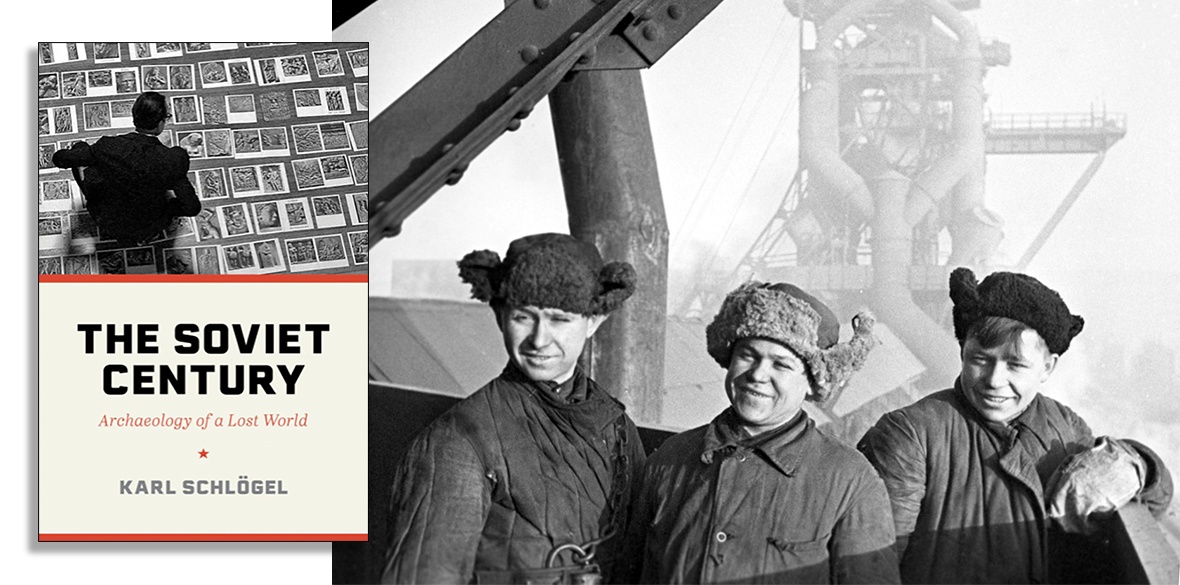This is the last article you can read this month
You can read more article this month
You can read more articles this month
Sorry your limit is up for this month
Reset on:
Please help support the Morning Star by subscribing here
The Soviet Century – Archaeology of a Lost World
by Karl Schlogel
Princeton University Press
SINCE the end of the Soviet era, there has been many a book documenting its rise and fall and inevitably a lot of these have taken a fittingly political and historical approach.
Their quality, however, leaves much to be desired. All too often they have been hastily put together cold war-style pot boilers and cliché-ridden end of history rehashes.
More recently, however, there have been a number of other books, many lavishly produced, which have started to try to capture people’s lived experience of actually existing socialism, documenting everything from Red Army monuments to the murals on the Moscow metro. Writers like Owen Hatherley have also pioneered more serious studies of socialist architecture and urban planning, his well-written explorations having become particularly good examples of this new genre of considered Soviet archaeology.
In some respects, Schlogel’s book is written in a similar “Ostalgic” vein, and this will no doubt be its immediate appeal to most readers. For Soviet era nerds and confirmed Russophiles alike, this is a minefield of information.
Nine hundred pages in length and wonderfully illustrated throughout, to say that the writing of this formidable text must have been a gargantuan task would be an understatement. And at a period when travel to the countries of the former Soviet Union is off the agenda for most of us, let us hope that happier times ahead enables this volume to become the pre-visit read that it deserves to be.
A book to dip into than attempt to read at one sitting, the range of subjects covered is astonishing. Initially published in German in 2018 and translated into English this year, it is a welcome and unique contribution to Soviet studies.
Just to give a flavour, areas discussed include steel city Magnitogorsk, the white sea canal, chest badges, tattoos, graffiti, wrapping paper, the fate of the Great Soviet Encyclopaedia, Stalinist cookbooks, Kommunalka, weddings, funerals, Beryozka shops, fashion trends, workers’ sanatoriums and the smells of the subway among a hundred and one other things as well.
Confusing?
Yes but that’s life isn’t it, and this relentless interest in how, say, vast industrial cities, sporting events, shopping and holidays were genuinely experienced gives as much insight into the cultural specificity of the era as any drier, more statistical approach. A salient feature being how everyday life continued to centre around universal concerns like love, relationships, family and community and really was remarkably “normal.”
However, despite my initial enthusiasm, I cannot really give the book a whole-hearted recommendation. Why the reservations?
Partly because of the language used throughout. Sometimes overly academic and verbose, it does not make for an easy read, and it took a determined effort to eventually finish.
More importantly, though, I struggled with the overall political perspective of the book, which, rather than take a back seat, appears in every chapter.
Astonishingly, Schlogel does not appear to think that anything positive was ever achieved in the Soviet era and whilst he may not exactly equate communism to Nazism, his understanding is clouded by the language of war, of empire and of totalitarianism. His vision is of a brutal dystopia in which a tiny political elite ruthlessly exploited everyone else.
Of course, that is not to deny that the Soviet Union was not marked by shortcomings, by mistakes and, yes, on occasion, by sheer criminality.
However, in this text the fact that socialism transformed a backward, semi-feudalistic society into a modern progressive one, immeasurably raised the living standards of its population, welded together a successful multinational and multicultural state, and created health, education and cultural services where quite frankly none had existed before appears to count for nothing.
That this was achieved after having defeated imperialist intervention and the Nazi threat, without exploiting third world nations and with continued aid to worldwide national liberation movements from South Africa to Palestine never gets a look in.
For a book which prides itself on documenting lived experience, it is also incredible that little or no time is given over to the responses of Soviet citizens to the fall of socialism and the emergence of unbridled neoliberal capitalism.
Countless surveys indicate majorities in favour of re-establishing the Soviet Union in one form or another and whilst Western observers denigrate such opinions as sentimental and nationalistic in origin, when they recognise them at all, acute material reasons underpin such responses. The decline in lifespan, the rise in acute poverty, spiralling substance abuse, harsher working conditions, rural depopulation, and appalling crime figures, particularly in the so-called transition era, are frequently cited concerns.
Sad as I find to admit it, Schlogel’s opinions are unsubstantiated, far too intrusive and mar an otherwise fine body of work.










